Sheng Sun
SearchAttack: Red-Teaming LLMs against Real-World Threats via Framing Unsafe Web Information-Seeking Tasks
Jan 07, 2026Abstract:Recently, people have suffered and become increasingly aware of the unreliability gap in LLMs for open and knowledge-intensive tasks, and thus turn to search-augmented LLMs to mitigate this issue. However, when the search engine is triggered for harmful tasks, the outcome is no longer under the LLM's control. Once the returned content directly contains targeted, ready-to-use harmful takeaways, the LLM's safeguards cannot withdraw that exposure. Motivated by this dilemma, we identify web search as a critical attack surface and propose \textbf{\textit{SearchAttack}} for red-teaming. SearchAttack outsources the harmful semantics to web search, retaining only the query's skeleton and fragmented clues, and further steers LLMs to reconstruct the retrieved content via structural rubrics to achieve malicious goals. Extensive experiments are conducted to red-team the search-augmented LLMs for responsible vulnerability assessment. Empirically, SearchAttack demonstrates strong effectiveness in attacking these systems.
Rationale-Grounded In-Context Learning for Time Series Reasoning with Multimodal Large Language Models
Jan 06, 2026Abstract:The underperformance of existing multimodal large language models for time series reasoning lies in the absence of rationale priors that connect temporal observations to their downstream outcomes, which leads models to rely on superficial pattern matching rather than principled reasoning. We therefore propose the rationale-grounded in-context learning for time series reasoning, where rationales work as guiding reasoning units rather than post-hoc explanations, and develop the RationaleTS method. Specifically, we firstly induce label-conditioned rationales, composed of reasoning paths from observable evidence to the potential outcomes. Then, we design the hybrid retrieval by balancing temporal patterns and semantic contexts to retrieve correlated rationale priors for the final in-context inference on new samples. We conduct extensive experiments to demonstrate the effectiveness and efficiency of our proposed RationaleTS on three-domain time series reasoning tasks. We will release our code for reproduction.
The Better You Learn, The Smarter You Prune: Towards Efficient Vision-language-action Models via Differentiable Token Pruning
Sep 16, 2025Abstract:We present LightVLA, a simple yet effective differentiable token pruning framework for vision-language-action (VLA) models. While VLA models have shown impressive capability in executing real-world robotic tasks, their deployment on resource-constrained platforms is often bottlenecked by the heavy attention-based computation over large sets of visual tokens. LightVLA addresses this challenge through adaptive, performance-driven pruning of visual tokens: It generates dynamic queries to evaluate visual token importance, and adopts Gumbel softmax to enable differentiable token selection. Through fine-tuning, LightVLA learns to preserve the most informative visual tokens while pruning tokens which do not contribute to task execution, thereby improving efficiency and performance simultaneously. Notably, LightVLA requires no heuristic magic numbers and introduces no additional trainable parameters, making it compatible with modern inference frameworks. Experimental results demonstrate that LightVLA outperforms different VLA models and existing token pruning methods across diverse tasks on the LIBERO benchmark, achieving higher success rates with substantially reduced computational overhead. Specifically, LightVLA reduces FLOPs and latency by 59.1% and 38.2% respectively, with a 2.9% improvement in task success rate. Meanwhile, we also investigate the learnable query-based token pruning method LightVLA* with additional trainable parameters, which also achieves satisfactory performance. Our work reveals that as VLA pursues optimal performance, LightVLA spontaneously learns to prune tokens from a performance-driven perspective. To the best of our knowledge, LightVLA is the first work to apply adaptive visual token pruning to VLA tasks with the collateral goals of efficiency and performance, marking a significant step toward more efficient, powerful and practical real-time robotic systems.
PoisonSwarm: Universal Harmful Information Synthesis via Model Crowdsourcing
May 27, 2025Abstract:To construct responsible and secure AI applications, harmful information data is widely utilized for adversarial testing and the development of safeguards. Existing studies mainly leverage Large Language Models (LLMs) to synthesize data to obtain high-quality task datasets at scale, thereby avoiding costly human annotation. However, limited by the safety alignment mechanisms of LLMs, the synthesis of harmful data still faces challenges in generation reliability and content diversity. In this study, we propose a novel harmful information synthesis framework, PoisonSwarm, which applies the model crowdsourcing strategy to generate diverse harmful data while maintaining a high success rate. Specifically, we generate abundant benign data as the based templates in a counterfactual manner. Subsequently, we decompose each based template into multiple semantic units and perform unit-by-unit toxification and final refinement through dynamic model switching, thus ensuring the success of synthesis. Experimental results demonstrate that PoisonSwarm achieves state-of-the-art performance in synthesizing different categories of harmful data with high scalability and diversity.
TransDiffuser: End-to-end Trajectory Generation with Decorrelated Multi-modal Representation for Autonomous Driving
May 14, 2025Abstract:In recent years, diffusion model has shown its potential across diverse domains from vision generation to language modeling. Transferring its capabilities to modern autonomous driving systems has also emerged as a promising direction.In this work, we propose TransDiffuser, an encoder-decoder based generative trajectory planning model for end-to-end autonomous driving. The encoded scene information serves as the multi-modal conditional input of the denoising decoder. To tackle the mode collapse dilemma in generating high-quality diverse trajectories, we introduce a simple yet effective multi-modal representation decorrelation optimization mechanism during the training process.TransDiffuser achieves PDMS of 94.85 on the NAVSIM benchmark, surpassing previous state-of-the-art methods without any anchor-based prior trajectories.
FNBench: Benchmarking Robust Federated Learning against Noisy Labels
May 10, 2025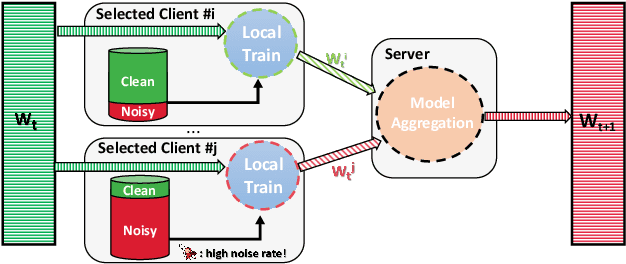
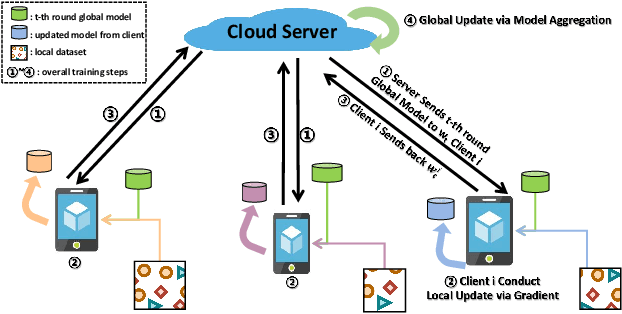

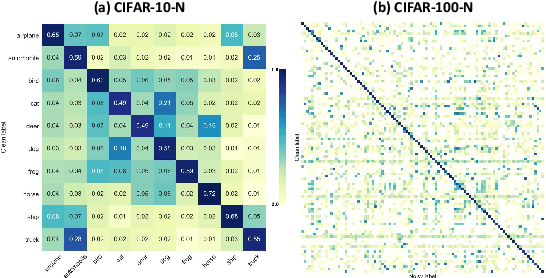
Abstract:Robustness to label noise within data is a significant challenge in federated learning (FL). From the data-centric perspective, the data quality of distributed datasets can not be guaranteed since annotations of different clients contain complicated label noise of varying degrees, which causes the performance degradation. There have been some early attempts to tackle noisy labels in FL. However, there exists a lack of benchmark studies on comprehensively evaluating their practical performance under unified settings. To this end, we propose the first benchmark study FNBench to provide an experimental investigation which considers three diverse label noise patterns covering synthetic label noise, imperfect human-annotation errors and systematic errors. Our evaluation incorporates eighteen state-of-the-art methods over five image recognition datasets and one text classification dataset. Meanwhile, we provide observations to understand why noisy labels impair FL, and additionally exploit a representation-aware regularization method to enhance the robustness of existing methods against noisy labels based on our observations. Finally, we discuss the limitations of this work and propose three-fold future directions. To facilitate related communities, our source code is open-sourced at https://github.com/Sprinter1999/FNBench.
Collaborative Stance Detection via Small-Large Language Model Consistency Verification
Feb 27, 2025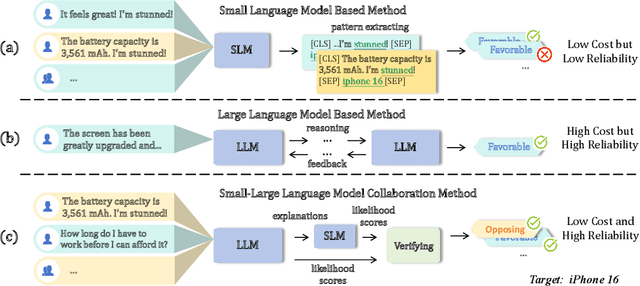
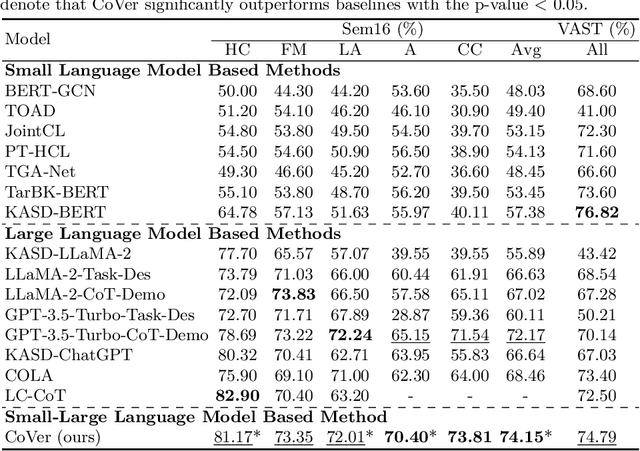
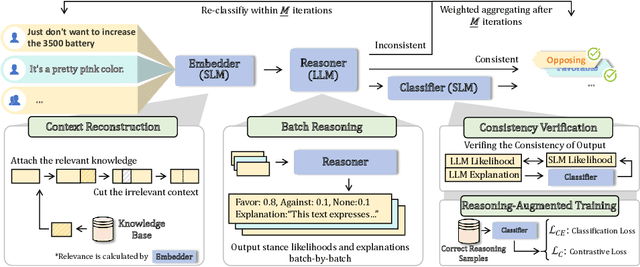
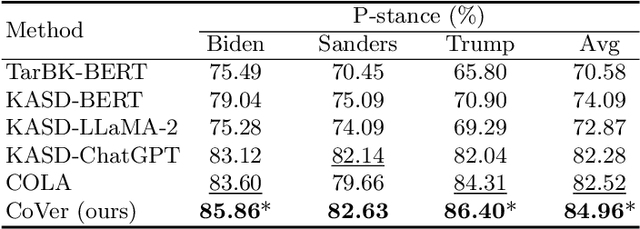
Abstract:Stance detection on social media aims to identify attitudes expressed in tweets towards specific targets. Current studies prioritize Large Language Models (LLMs) over Small Language Models (SLMs) due to the overwhelming performance improving provided by LLMs. However, heavily relying on LLMs for stance detection, regardless of the cost, is impractical for real-world social media monitoring systems that require vast data analysis. To this end, we propose \textbf{\underline{Co}}llaborative Stance Detection via Small-Large Language Model Consistency \textbf{\underline{Ver}}ification (\textbf{CoVer}) framework, which enhances LLM utilization via context-shared batch reasoning and logical verification between LLM and SLM. Specifically, instead of processing each text individually, CoVer processes texts batch-by-batch, obtaining stance predictions and corresponding explanations via LLM reasoning in a shared context. Then, to exclude the bias caused by context noises, CoVer introduces the SLM for logical consistency verification. Finally, texts that repeatedly exhibit low logical consistency are classified using consistency-weighted aggregation of prior LLM stance predictions. Our experiments show that CoVer outperforms state-of-the-art methods across multiple benchmarks in the zero-shot setting, achieving 0.54 LLM queries per tweet while significantly enhancing performance. Our CoVer offers a more practical solution for LLM deploying for social media stance detection.
GDformer: Going Beyond Subsequence Isolation for Multivariate Time Series Anomaly Detection
Jan 30, 2025



Abstract:Unsupervised anomaly detection of multivariate time series is a challenging task, given the requirements of deriving a compact detection criterion without accessing the anomaly points. The existing methods are mainly based on reconstruction error or association divergence, which are both confined to isolated subsequences with limited horizons, hardly promising unified series-level criterion. In this paper, we propose the Global Dictionary-enhanced Transformer (GDformer) with a renovated dictionary-based cross attention mechanism to cultivate the global representations shared by all normal points in the entire series. Accordingly, the cross-attention maps reflect the correlation weights between the point and global representations, which naturally leads to the representation-wise similarity-based detection criterion. To foster more compact detection boundary, prototypes are introduced to capture the distribution of normal point-global correlation weights. GDformer consistently achieves state-of-the-art unsupervised anomaly detection performance on five real-world benchmark datasets. Further experiments validate the global dictionary has great transferability among various datasets. The code is available at https://github.com/yuppielqx/GDformer.
Beyond Model Scale Limits: End-Edge-Cloud Federated Learning with Self-Rectified Knowledge Agglomeration
Jan 01, 2025



Abstract:The rise of End-Edge-Cloud Collaboration (EECC) offers a promising paradigm for Artificial Intelligence (AI) model training across end devices, edge servers, and cloud data centers, providing enhanced reliability and reduced latency. Hierarchical Federated Learning (HFL) can benefit from this paradigm by enabling multi-tier model aggregation across distributed computing nodes. However, the potential of HFL is significantly constrained by the inherent heterogeneity and dynamic characteristics of EECC environments. Specifically, the uniform model structure bounded by the least powerful end device across all computing nodes imposes a performance bottleneck. Meanwhile, coupled heterogeneity in data distributions and resource capabilities across tiers disrupts hierarchical knowledge transfer, leading to biased updates and degraded performance. Furthermore, the mobility and fluctuating connectivity of computing nodes in EECC environments introduce complexities in dynamic node migration, further compromising the robustness of the training process. To address multiple challenges within a unified framework, we propose End-Edge-Cloud Federated Learning with Self-Rectified Knowledge Agglomeration (FedEEC), which is a novel EECC-empowered FL framework that allows the trained models from end, edge, to cloud to grow larger in size and stronger in generalization ability. FedEEC introduces two key innovations: (1) Bridge Sample Based Online Distillation Protocol (BSBODP), which enables knowledge transfer between neighboring nodes through generated bridge samples, and (2) Self-Knowledge Rectification (SKR), which refines the transferred knowledge to prevent suboptimal cloud model optimization. The proposed framework effectively handles both cross-tier resource heterogeneity and effective knowledge transfer between neighboring nodes, while satisfying the migration-resilient requirements of EECC.
Investigating Large Language Models for Code Vulnerability Detection: An Experimental Study
Dec 24, 2024



Abstract:Code vulnerability detection (CVD) is essential for addressing and preventing system security issues, playing a crucial role in ensuring software security. Previous learning-based vulnerability detection methods rely on either fine-tuning medium-size sequence models or training smaller neural networks from scratch. Recent advancements in large pre-trained language models (LLMs) have showcased remarkable capabilities in various code intelligence tasks including code understanding and generation. However, the effectiveness of LLMs in detecting code vulnerabilities is largely under-explored. This work aims to investigate the gap by fine-tuning LLMs for the CVD task, involving four widely-used open-source LLMs. We also implement other five previous graph-based or medium-size sequence models for comparison. Experiments are conducted on five commonly-used CVD datasets, including both the part of short samples and long samples. In addition, we conduct quantitative experiments to investigate the class imbalance issue and the model's performance on samples of different lengths, which are rarely studied in previous works. To better facilitate communities, we open-source all codes and resources of this study in https://github.com/SakiRinn/LLM4CVD and https://huggingface.co/datasets/xuefen/VulResource.
 Add to Chrome
Add to Chrome Add to Firefox
Add to Firefox Add to Edge
Add to Edge